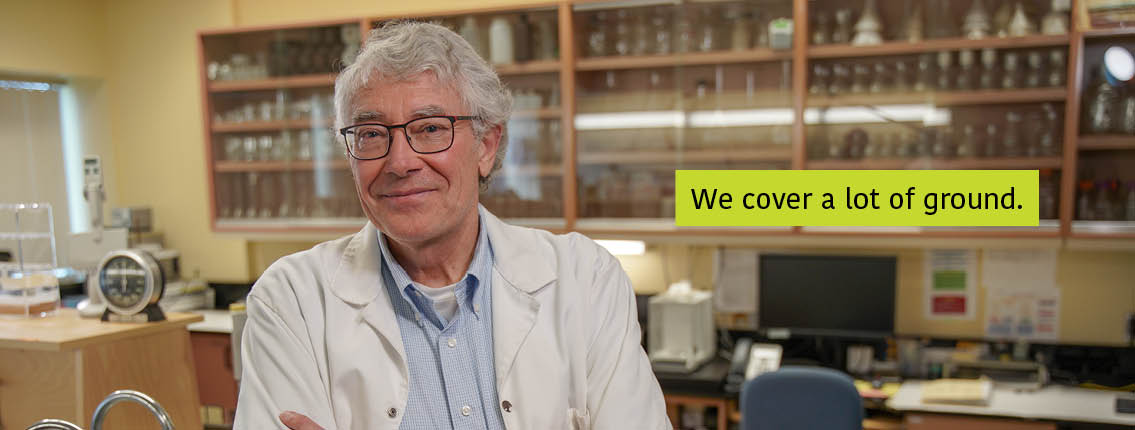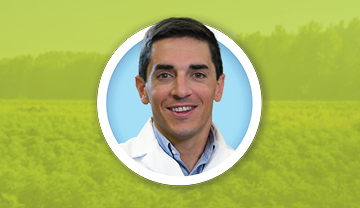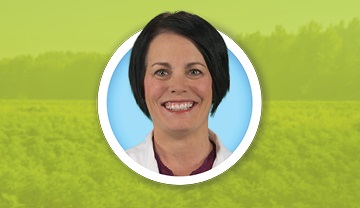
Dr. Candido Pomar
Research Scientist - System Analysis - Precision Nutrition and Modelling
Sherbrooke Research and Development Centre
Why did you become a scientist?
I’ve always been interested in animal nutrition, and while I was researching to help producers to formulate optimal feeds for pig herds, I saw that there was a big difference in the amounts of nutrients individual pigs need. I was intrigued by the possibility of feeding the pigs just what they needed—and no more—for optimal growth and efficiency.
Meet Dr. Candido Pomar
Video transcript
*NOTE: This footage was recorded prior to the Government of Canada's physical distancing guidelines. Canadians are encouraged to continue to follow COVID-19 safety guidelines.
[Technological music starts. A group of pigs feed in a pen.]
Candido Pomar: Pigs are very different.
[Pigs press their noses through the bars of their pen.]
You have in the same group pigs that maybe are weighing 70 kilos…
[Pigs feed in separate feeding stalls.]
… and others 120 kilos.
[One large pig finishes eating in its pen.]
Their needs are not the same.
[Candido Pomar speaks to others in the hallway of a research station.]
When you have to feed a big group with the same feed, it’s very difficult to decide what is the right level of nutrients…
[Small pigs interact in a pen with buckets of feed outside.]
… because you always are going to have a proportion of pigs that are going to be over or underfed.
[A farmer’s hand scoops up a pile of feed.]
So they say, “Why we don’t go to feed each pig with the amount of nutrients they need?”
[A worker in an orange suit wheels a bin of feed down a hall. He uses it to fill a number of pig feeding machines.]
And the idea starts from there.
[Candido crosses his arms and smiles in front of a pig feeding machine. Text appears beneath him.]
Text on screen: Sherbrooke, Québec
[Cut to Candido being interviewed in his lab. Text appears beneath him.]
Text on screen: Dr. Candido Pomar, Research Scientist – Precision pig feeding, Agriculture and Agri-Food Canada
My name is Candido Pomar. I’m a research scientist for Agriculture and Agri-Food Canada.
[Candido exits a research library and walks down a hall.]
These days I’m concentrating in the development of precision nutrition and precision farming.
[Lights flash on an Intelligent Precision Feeder machine.]
We have been concentrating in the recent years to develop systems which provide each pig…
[Pigs feed from the Intelligent Precision Feeders.]
… with the feed that they need every day…
[Close-up of a pig eating from a precision feeder.]
… but today we are going much farther. We are not just looking to what the animal needs to eat, we are looking at how the animals are eating and try to identify when there is a problem.
[Many researchers work at computers.]
For instance, with these new systems, we can identify an animal very quickly when they start to be sick.
[Candido demonstrates the pattern of pig feeding.]
The animals that are healthy, they always eat in the same way. Each pig has their own pattern, their own behavior of feed intake. But a sick animal, that changes.
[Candido walks down a hall in the research station and goes through a door.]
So we can identify very quickly when this change appears and then tell it to the producer.
[A smiling producer holds a young pig in her arms.]
So the farmer can instantly apply what we’ve found here in the research station. What’s important is to find the best way to feed the pigs.
[Cut to a white screen with text.]
Text on screen: Learn more at agr.gc.ca/fields-of-science. We cover a lot of ground.
[The Canada wordmark appears. The technological music fades out.]
Profile
What do you like most about your work?
There are a lot of things I like about my work. Feeling that we are helping producers to reduce production costs, reduce environmental impact and more is an important aspect of our work.
However, working with young people is definitely the most stimulating aspect! For me, it is a privilege to be surrounded by young, motivated students who have a dream and are working to become great professionals, or university professors or renowned researchers.
What is the coolest fact in your field of science?
Taking up the challenge of better understanding animal metabolism to develop innovative production methods that will help producers meet their production challenges. The livestock industry has to continually adapt not only to changes in national and international trade rules, but also increasingly to a society with growing animal welfare requirements and environmental standards. Our research is essential to help producers meet these challenges.
What is the most common question people ask you about your work?
"Is this production approach realistic? How much will the equipment cost? What will be the return on investment?"
Who inspired your career or who is your idol?
Marie Curie.
What is your favourite dish?
Salted cod.
Better pork, one pig at a time
Canada is known as a producer of high quality pork, both at home and abroad. In keeping with their reputation, Canadian pork producers prioritize the treatment and health of pigs used for pork production.
Agriculture and Agri-Food Canada (AAFC) scientist Dr. Candido Pomar has dedicated his life's work creating the best solutions that impact animal well-being. "Pigs that are treated right make the best pork," explains Dr. Pomar. "Farmers have to balance how effective the pigs' food is with keeping them happy and healthy.
"But the right balance is hard to find. Too little nutrients, and pigs don't gain weight efficiently; too much, and they excrete more nutrients than they should. If the pigs excrete too much, it can have a negative impact on the environment."
An AAFC research team, led by Dr. Pomar at the Sherbrooke Research and Development Centre, has found that healthy weight gain can be controlled by giving each pig its own unique diet that meets their specific nutrient needs. They have developed a new feeding process to support this finding.
"The process is called precision feeding, and it is one of the most promising ways to promote high quality pork that does not sacrifice the pigs' well-being," describes Dr. Pomar.
Precision feeding involves giving each pig a unique ear tag that links to a computer. When meals are given, the pigs approach the feeding stations, which identifies their ear tag. The computer recognizes that specific pig and gives a personalized amount of food, pre-planned just for them, to meet their nutritional needs.
Not only do the computers keep track of every pig's special diet, but they are also used to prevent diseases.
"The computers also record whether the pigs eat all their food," Dr. Pomar explains. "This helps farmers identify early disease symptoms in individual pigs, without treating the whole group."
With precision feeding, farmers are able to raise their pigs in a way that encourages well-being, is more beneficial to the environment and produces top-quality pork. The principles of precision feeding developed in Dr. Pomar's laboratory are used by many leading livestock companies. Negotiations are underway to enter a collaborative agreement to commercialise the automated livestock system in the near future.
More agriculture and agri-food science

Find out how scientists are working to transform crop diseases into harmless anti toxins to better protect your food.

Learn how scientists are working with NASA to improve soil moisture data needed for Canadian crops to grow.

Meet our scientists, discover their work, see how their research impacts you.